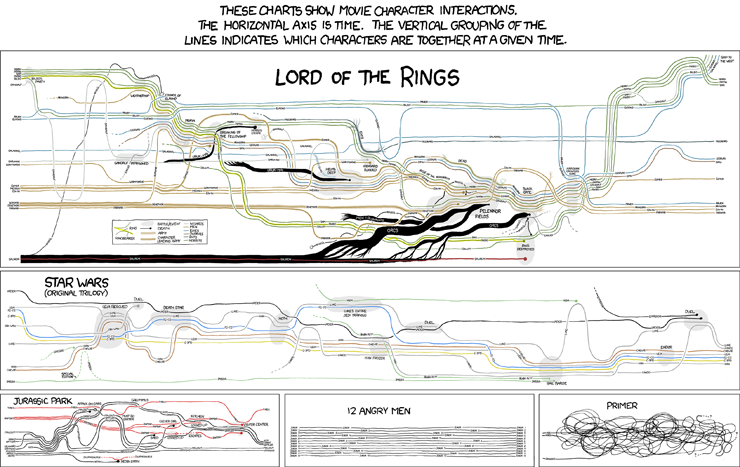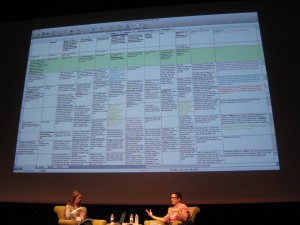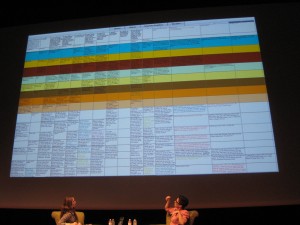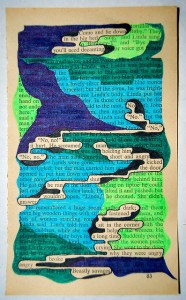xkcd: Movie Narrative Charts
Here’s an example from xkcd that might help you to think about how to represent Fun Home visually. There are lots of other visualizations that might spark some creative thought listed in the shop area.

xkcd #657.
ENG101.12. Spring 2015. Emory University.

Here’s an example from xkcd that might help you to think about how to represent Fun Home visually. There are lots of other visualizations that might spark some creative thought listed in the shop area.

xkcd #657.
I was looking for an image on Flickr today and stumbled upon a few photos from a conference on Comics Philosophy and Practice that might be of interest to you.

“original story spreadsheet for “Are You My Mother?”” by Flickr user Karen Green

“spreadsheet entries began to coalesce into threads
” by Flickr user Karen Green
These two spreadsheets are not from Fun Home but its sequel, Are You My Mother? (And here’s a more close-up shot of the latter.) That’s Bechdel on the right, discussing the spreadsheets–she seems to be outlining the process by which she went about organizing the narrative threads into the book. I don’t know if she used a similar spreadsheet for Fun Home too, but it’s safe to say based on the book itself and these images, that Bechdel very carefully structures and organizes the narrative and thematic elements of her books.
These photos of Bechdel’s presentation might help you to think about how to analyze the structure of Fun Home for your projects.

The AIDS Coalition to Unleash Power protests in New York City against the bill. Wikipedia entry.
Last year, Uganda passed a law criminalizing homosexuality, which was ultimately invalidated by the nation’s top court, but for a span of almost a year consenting adults who engaged in homosexual sex might be punished with life in prison and anyone who was found to be counseling gay people would have faced 7 years in prison. Here is the Wikipedia article describing the law. The day after the law was passed, one of the Ugandan tabloids published “EXPOSED! Uganda’s 200 Top Homos Named,” which seemed to be a provocation not only for the police but for vigilantes to go after the people identified.
Some American pastors served as consultants for the nation of Uganda in drafting this bill, including Scott Lively, an anti-gay activist best known for his book The Pink Swastika, which has been thoroughly discredited by historians but that blames the Holocaust on homosexuals. Lively’s organization has been officially designated by the Southern Poverty Law Center as a hate group. Lively was interviewed by NPR’s Michele Martin on 2/27/14 about the Ugandan law and gay rights. The first part of the story may or may not be interesting to think about, but the reason I’m linking you to this interview is the ending. Lively says that perhaps the Ugandan law is a tiny bit extreme, and proposes his own best case scenario for how homosexuality should be handled in the US, to return to the times before the Stonewall Riots Alison Bechdel describes in chapter 4. Lively says:
Well, I believe that societies of the world have an affirmative duty to protect the natural family and to discourage all sex outside of marriage. And I’m talking about adultery, fornication, homosexuality, incest, all of it. But I also believe that in our societies we should have, you know, reasonable tolerance for people who decide to live outside the mainstream discreetly. I think we had a pretty good balance in the 1940s and ’50s in this country. Unquestionably, it was a family-centered mainstream culture and subcultures in which homosexuals and others could live out their lives and be happy.
There’s also an article from last year about the South Carolina legislature punishing the College of Charleston for including Fun Home on a list of recommended reading over the summer. One legislator in South Carolina said that it is inappropriate to have open discussion in college classrooms about homosexuality–that such topics are not worthy of scholarly attention. Bechdel is quoted as replying, in part, that “It’s sad and absurd that the College of Charleston is facing a funding cut for teaching my book – a book which is after all about the toll that this sort of small-mindedness takes on people’s lives.”
It might be useful for you to think about these questions as you develop your maps of Fun Home.
For this Sunday Funnies assignment, I decided to quote Mahatma Ghandi.
“Be the change you want to see in the world.” – Ghandi
I live by this quote because it inspires me to better myself as an individual. If I could change one thing in this world it would be how people of different ethnicities interact with each other politically, socially, and economically. This quote has made me realized why I should accept people for who they are no matter what.
Citations:
“Mahatma Gandhi.” BrainyQuote.com. Xplore Inc, 2015. 22 March 2015. <http://www.brainyquote.com/quotes/quotes/m/mahatmagan109075.html
Read more at http://www.brainyquote.com/citation/quotes/quotes/m/mahatmagan109075.html#jPp eHfpycq1zdPI.99>
Photo by SDSU News Center
Photo by Diversity at AARP
Photo by Port Authority of New York and New Jersey

| 10 | 3/23 | Vietnamerica (to p. 47) |
| 3/25 | Vietnamerica (to p. 82) | |
| 3/27 | Workshop time for Mapping Fun Home.
Writer/Designer chapter 6 |
|
| 3/29 | Due: Sunday Funnies 7 |
This week, you should be working on your Mapping Fun Home projects as we begin reading G.B. Tran’s Vietnamerica.
You’ll have time in class on Friday to work on your projects and to ask questions about them as you progress, so please come to class with your ideas developed. The better your sense of what you’re trying to accomplish, the better your classmates and I will be able to help you to accomplish your goals and to push your ideas further.
As we begin reading Vietnamerica, you might want to check out the trailer for the book.
VIETNAMERICA from Joe Tomcho on Vimeo.
Note that there are page numbers in the book, but only intermittently. It might be worth adding page numbers to your text or using post-it notes so you can find specific pages in class.
(image credit: “10-10-10” by Flickr user woodleywonderworks.)

For this week’s Sunday Funnies, I decided to use a quote by Mark Twain.
Credits:
“Top 100 Inspirational Quotes.” Forbes. Forbes Magazine, 28 May 2013. Web. 22 Mar. 2015.
I read this book a while ago but this quote was the one that came to my mind when I first heard about this assignment. I feel that this quote is really motivating and although it was very difficult, and I ran into many problems during the process, I had a lot of fun illustrating this project.
Quote Reference:
Posada, Joachim De., and Ellen Singer. Don’t Eat the Marshmallow– Yet!: The Secret to Sweet Success in Work and Life. New York: Berkley, 2005. Print.
For this Sunday Funnies assignment, I chose a quote by Arthur Ashe.
“Success is a journey, not a destination.”
-Arthur Ashe
Citations:
“Arthur Ashe Quote.” BrainyQuote. Xplore, n.d. Web. 22 Mar. 2015. <http://www.brainyquote.com/quotes/quotes/a/arthurashe371528.html>.
Photo by Hartwig HKD
Photo by Scott Willis
Photo by Alan

Due: 3/29
The British artist Tom Phillips is probably best known for a project that he began in 1966 and which he has continued ever since–he set himself the challenge to buy the first book he could find at a secondhand bookstore for threepence and to alter every page using drawing, painting, collage, and cut-up techniques to create an entirely new version.
He found W.H. Mallock’s A Human Document and combined the words in the title to create A Humument. Phillips not only created new art works from each of the 367 pages but has now completed five different editions of this altered book.
You can view pretty much the complete series of pages on Tom Phillips site here. You can choose pages, view the original and then view different versions of that page.
For this week’s funnies assignment, I want you to create your own visual poem-thing. You can find your own page to alter if you’d like, but I’ll bring in an old used book that you can take pages from too. Think of it as sort of a collaboration between yourself and the book’s original author or think of it as a game where you get to create new text but within the strict confines of the text available on the page.
Obviously, Tom Phillips has been doing this for almost 50 years and I’m not expecting you to produce work that is as polished or complex as his–nor that is necessarily as visually compelling. And it will probably feel very strange to you as you begin, but just let yourself be playful and experiment with your task. You do not need to be a professional artist to make these pages, but you probably do need to be able to relax your desire to be in control of what you produce and you probably need to turn off the self-critical voice that will tell you that you’re doing it wrong.
Alter your page using whatever methods or tools you prefer, then scan the page in color at a high resolution as a JPG or PNG file and load it to your site. You might include in your post the text of your altered page.
(featured image credit: Screenshot of Google image search screen for Tom Phillips Human Document.)
A number of years ago, I started ripping up books and gluing the pages onto canvas or boards and doodling on them just as a more or less random art project. I showed a friend, who told me about Phillips’ work, and I started playing around with it. At first, I honestly felt kind of silly, but then I made this page:
 “Beastly Savages by me. |
It reads:
Come and lie down in the big bed you’ll need decanting No “No.” “No,” “No, no!” it hurt. He screamed “No, no.” dark; fastened sit in the corner help a long time crying why they were angry broke angry Beastly savages |
As you can see, there’s nothing particularly complicated about this page visually, but I definitely had the feeling